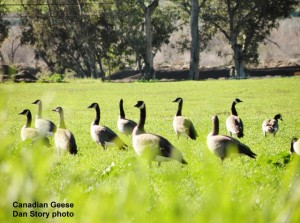 God Cares for Nature and Expects Humans to Do the Same
God Cares for Nature and Expects Humans to Do the Same
In my last three blog articles, I surveyed five sub-doctrines of the biblical doctrine of creation that are foundational to establishing a Bible-based theology of nature. In this article, I’ll tie all five sub-doctrines together by considering ways in which God expresses a heartfelt and earnest concern for non-human life—and for this reason (among others we’ll look at) expects the human race to be His caretakers (stewards) in nature.
It is undeniable that God desires all animal life to survive and prosper and fulfill the purpose of their creation. He has made ample provisions to ensure that this will happen by providing food, shelter, and habitats for wildlife, and by charging them to reproduce and spread across the globe. God even allowed birds to nest in the temple (Ps. 84:3).
Nowhere does the Bible communicate God’s love and joy for animals independent of His love and joy for people more clearly than in Job 38 and 39 (the longest passage in the Bible that focuses on non-human creation) and Psalm 104 (the most descriptive passage of God preparing nature to support animal life). These passages mention specific animals and specific habitats, which God prepared for individual varieties of animals. The wild donkey was given “the wasteland as a home, the salt flats as his habitat” (Job 39:6). The Ostrich “lays her eggs on the ground and lets them warm in the sand” (13-14). The eagle builds “his nest on high” and “dwells on a cliff . . . a rocky crag is his stronghold” (27-28). God “makes springs pour water into the ravines; it flows between the mountains” to give “water to all the beasts of the field.” There “the wild donkeys quench their thirst” (Ps. 104:10-11). God waters the trees He created, and there “the birds make their nests; the stork has its home in the pine trees. The high mountains belong to the wild goats; the crags are a refuge for the coneys” (17-18). God “provides food for the raven” (Job 38:41) and the lions “seek their food from God” (Ps. 104:21). Indeed, all animals, the Psalmist declares, look to God “to give them their food at the proper time” (27). The oceans as well as the land are included when the Psalmist passionately praises God for all He has made:
How many are your works, O Lord!
In wisdom you have made them all.
The earth is full of your creatures.
There is the sea, vast and spacious,
teeming with creatures beyond number,
living things both large and small (24-25).
There are two significant things we can learn from these passages. First, God provides food, shelter, and habitats for wild animals apart from human considerations. Second, only God is present and observes much of what happens in nature. In many of His reflections on wild nature, humans are totally absent. God causes rain to “water a land where no man lives, a desert with no one in it” (Job 38:26). He asked Job, “Do you know when the mountain goats give birth? Do you watch when the doe bears her fawn? Do you count the months till they bear? Do you know the time they give birth?” (39:1-2). The self-evident answer to these rhetorical questions, of course, is that only God observes these events and is present when they occur.
In sum, nature belongs to God. He didn’t create nature and animal life and then relinquish total authority over them to the human race, so that people can use and abuse them as they please. Animals have intrinsic worth because God created, values, owns, and finds joy in them (Ps. 104:31; Col. 1:16): “For every animal of the forest is mine, and the cattle on a thousand hills. I know every bird in the mountains, and the creatures of the field are mine” (Ps. 50:10–11).
Does this sound like a God who created nature solely for human consumption and who is “indifferent” to how people treat it? Hardly! Many other passages throughout the Bible portray an entirely different biblical picture of God and nature than what critics allege. The earth belongs to God, not people; He created it. God cares for nature apart from (but not above) His love and care for people. As the psalmist said, “O LORD, you preserve both man and beast. (36:5–6)
This fact alone is sufficient reason for the human race to take a caretaker’s role over the natural world. As theologian William Dyrness remarked, “Here lies a great justification for the preservation of wilderness areas that exist for no other purpose than to exhibit the greatness of God by preserving his creative work.” (Tending the Garden; Essays on the Gospel and the Earth, 63)
But something happened that tarnished the perfection and goodness of God’s creation. Due to human sin, nature became marred and corrupted. This tragic story and its consequences are the subject of the next two blog articles, and are important to understand as I continue to develop a theology of nature. ©
* The blog articles in this series are adapted from my book Should Christians Be Environmentalists? published by Kregel Publications in 2012. The blog articles do not contain all the chapters, data, quotes, references, or my personal experiences, which the book includes. So, for “the rest of the story” you will need to purchase the book, which is available in both paperback and Kindle. This and the following articles are copyrighted material and may not be reproduced in book or article form. But feel free to send links to these articles to your personal email list, Facebook friends and groups, Twitter followers, or other people who may enjoy them.